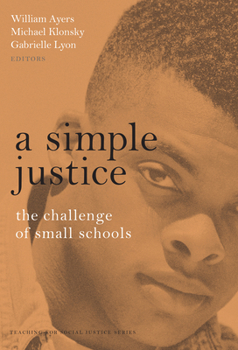A Simple Justice: The Challenge for Small Schools
Select Format
Select Condition 
Book Overview
From the contributors: "Small schools provide a context in which social relations between and among youth and adults, school and community, parents and teachers, and among educators are imbued with respect, reciprocity, and commitments to a larger common good." --Michelle Fine "There are a host of irrefutable reasons why small schools are the easiest, most economical, and wisest single school reform idea around." --Deborah...
Format:Paperback
Language:English
ISBN:0807739626
ISBN13:9780807739624
Release Date:May 2000
Publisher:Teachers College Press
Length:208 Pages
Weight:1.00 lbs.
Dimensions:0.6" x 6.1" x 8.9"
Customer Reviews
1 rating
small schools are great but how do we get them?
Published by Thriftbooks.com User , 22 years ago
I emphatically agree with the book's central message: Small schools are greatly preferable to large. (I went through public school in L.A.; I should know.)The book gives many wonderful examples of how small schools have revolutionized education in a number of places where public schools had been failing their students. The authors were among those dedicated enough to see through the building, running, and nurturing of such places of learning.The book also gave a glimpse of what education is meant to be-- intense investigation, asking endless series of questions addressing issues of student interest, a process of learning for teacher as well as student--and contrasted this with what goes on in a typical factory-model school. Hurrah!Unfortunately, the book made two glaring omissions (thus the four stars, not five). First, there was extremely little discussion of the resources needed to make this happen, and the corresponding lack of political will. It is easy to point out that wealthy school districts think $12,000 a student-year is an appropriate amount to spend for top-flight education, and that the special needs of poor districts suggest that even more is needed there. (And this is still mostly using the factory- model school for middle and high school.) But it is another thing altogether to develop a political strategy to deal with the discrepancies. Second, I believe that the factory-model school is actually failing almost everyone, not just the poor in the city. Ideals of education are met no better in Novato, CA, than in Oakland. School is an impersonal waste of time in Novato, too. Issues of social justice are nowhere on the radar screen there, either. Kids go to "civics" class, biology, etc. Curriculum never changes, kids do not get to develop major educational programs based on their interests.We need to find ways of encouraging everyone to engage in a discussion of social justice. Reagan and his welfare queen, Bush and Willie Horton, and years of perverse race-based criminal justice approaches (most notably the war on drugs), have set us back immeasurably. Milton Friedman has won; all the progressive tax systems are being whittled back; social services--from health care to welfare to, you guessed it, public education--are on the out.Everyone should be in on this mission. I think the book speaks far too narrowly to the inner city and not broadly enough. (An important question here is whether we are asking city schools to perform wildly different functions from suburban schools, and if so, whether this is serving either of these populations.)






